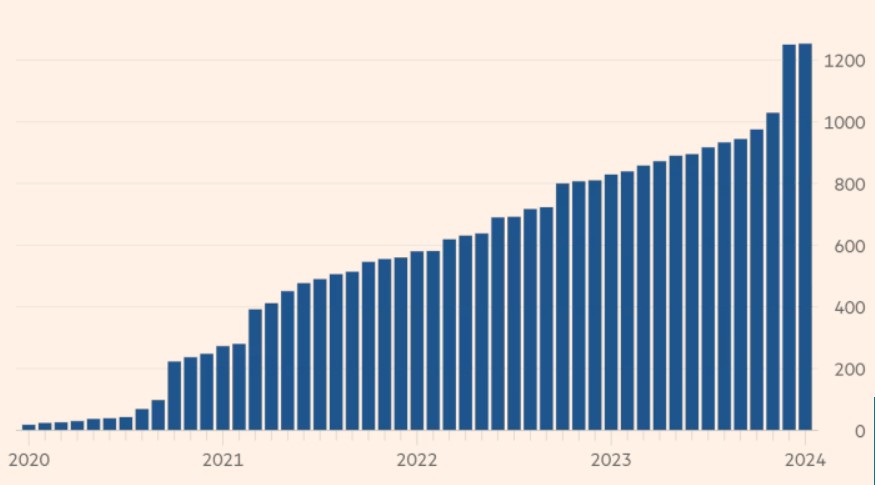- January 15, 2024
- Posted by: admin
- Category: BitCoin, Blockchain, Cryptocurrency, Investments
According to a report by the Financial Times, the United Nations (UN) Office on Drugs and Crime has identified Tether, one of the world’s largest cryptocurrency platforms, as an increasingly popular tool for money launderers and fraudsters operating in Southeast Asia, adding to increased regulatory scrutiny of the stablecoin issuer.
Tether As Preferred Choice For Money Laundering?
Per the report, the UN highlights a deceptive tactic known as “pig butchering,” in which criminals engineer false romantic connections to gain their victims’ trust before persuading them to transfer substantial sums of money.
Law enforcement agencies and financial intelligence authorities have observed a rapid growth in using sophisticated, high-speed money laundering techniques involving Tether.
The report notes that the evolution of cryptocurrency, coupled with other technological advancements, has further facilitated the practice of using black market casinos to launder illicit funds, specifically in Southeast Asia.
According to the United Nations, online gambling platforms, particularly those operating illegally, have become popular vehicles for cryptocurrency-based money laundering, with Tether being the preferred choice.
Moreover, criminal organizations have effectively established a parallel banking system using new technologies, exploiting online casinos’ “loosely regulated nature” and the speed and irreversibility of Tether transactions.

However, it is worth noting that Tether has tried to combat bad actors using its stablecoin for illicit activities. As part of these efforts, the stablecoin issuer froze $225 million worth of its tokens linked to a criminal syndicate involved in “pig butchering” and human trafficking in Southeast Asia following a joint investigation with US authorities and the OKX crypto exchange.
In addition, the Financial Times has been accused by crypto community members of their alleged negative bias towards the nascent industry. In response to the report, Paolo Ardoino, CEO of Tether, stated:
As usual, the Financial Times seems to write news based on little knowledge of the facts and decidedly favorable to the old guard of traditional finance, which finds itself overwhelmed by the success of new technologies and is struggling to avoid being obliterated by them.
Criminal Organizations Exploiting Regulatory Weaknesses
The UN report sheds light on cryptocurrencies’ regulatory challenges, emphasizing that “cryptocurrency regulations lag behind the illicit activities they seek to combat.”
According to the report, organized crime groups have “exploited the vulnerabilities and weaknesses in the regulatory framework,” further fueling the growth of illicit Tether transactions.
The report claims that despite enforcement crackdowns on digital assets in the United States and other jurisdictions, “criminal organizations continue to embrace Tether’s token as an effective method for moving funds.”
Some casinos have even started specializing in handling USDT transactions, as evidenced by a money laundering syndicate in Shan State, Myanmar, which advertises Tether exchange services openly.
Tether has recently faced regulatory scrutiny due to concerns about managing its assets and its ties with financial institutions.
In 2021, the US Commodity Futures Trading Commission (CFTC) accused the stablecoin issuer of “misleading statements” regarding backing its stablecoin with sufficient dollars. Tether ultimately paid a $41 million fine without admitting liability.
Furthermore, as reported by Bitcoinist Tether had deposited over $1 billion with a subsidiary of Britannia Financial Group, led by Venezuelan-Italian banker Julio Herrera Velutini.
US authorities subsequently charged Velutini in an alleged bribery scheme, although Britannia Financial was not implicated. The case is ongoing.
Featured image from Shutterstock, chart from TradingView.com